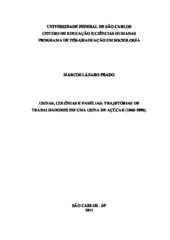Usinas, colônias e famílias: trajetórias de trabalhadores em uma usina de açúcar (1960-1990)
Resumo
ABSTRACT The management of the workforce takes different configurations. According with specific historical and social contexts, we observe the emergence of different orderings in which the relation between capital and labor is increased beyond the conditions stated objective. We analyzed one of these contexts in a traditional sugar mill and ethanol in the region of Ribeirao Preto, state of São Paulo, between the 1960 and 1990. Originated from a farm that was once the second largest producer of coffee, this plant has retained many features of that period as the provision of housing of old "colonies" and the management of patrimonial work, reconciled with elements of rationalization of production and work. The approach allows us to assert that conjuncture the existence of an effective link between the traditional and modern forms, which established relationships between plant owners and residents. So specifically, we found a set of counterparts given by the company families of residents, with regard not only to housing but also the entry and growth within the frameworks of these hierarchical the company. Through the company's historical reconstruction and recovery the trajectories of the families who resided in their homes, discuss this model, its intrinsic characteristics, as well as the conditions that led to his disappearance on account of restructuring production in the 1990.
